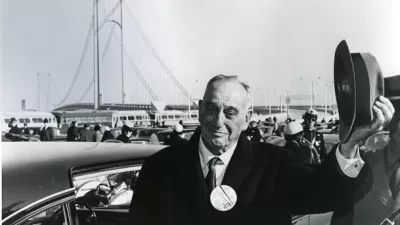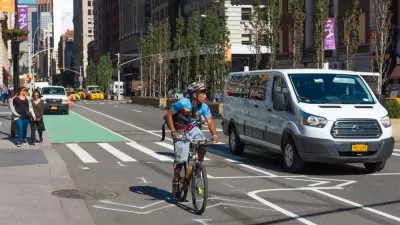The New Yorker offers a long profile of New York City Mayor Michael Bloomberg, and highlights his efforts to "undo" the work of Robert Moses.
"Bloomberg took office during a recession, and quickly established himself as a bold and decisive fiscal manager, ultimately demonstrating, as his friend Mitchell Moss, an urban-planning professor at N.Y.U., says, that New York was "open for business after 9/11." As the economy recovered, Bloomberg set about trying to transform the city, on a scale not seen since the days of Robert Moses. "I think if you look, we've done more in the last seven years than-I don't know if it's fair to say more than Moses did, but I hope history will show the things we did made a lot more sense," Bloomberg told me. "You know, Moses did some things that turned out not to be great: cutting us off from the waterfront, putting roads all along the water." The Bloomberg model, under the direction of Deputy Mayor Dan Doctoroff and Amanda Burden, the City Planning Commissioner, was based to a large extent on undoing the Moses legacy: rezoning for commercial and residential use large tracts of waterfront property that had once been the province of industry."
Thanks to ArchNewsNow
FULL STORY: The Untouchable

Alabama: Trump Terminates Settlements for Black Communities Harmed By Raw Sewage
Trump deemed the landmark civil rights agreement “illegal DEI and environmental justice policy.”

Planetizen Federal Action Tracker
A weekly monitor of how Trump’s orders and actions are impacting planners and planning in America.

The 120 Year Old Tiny Home Villages That Sheltered San Francisco’s Earthquake Refugees
More than a century ago, San Francisco mobilized to house thousands of residents displaced by the 1906 earthquake. Could their strategy offer a model for the present?

High-Speed Rail Tracker
Smart Cities Dive follows high-speed rail developments around the country

Ken Jennings Launches Transit Web Series
The Jeopardy champ wants you to ride public transit.

BLM To Rescind Public Lands Rule
The change will downgrade conservation, once again putting federal land at risk for mining and other extractive uses.
Urban Design for Planners 1: Software Tools
This six-course series explores essential urban design concepts using open source software and equips planners with the tools they need to participate fully in the urban design process.
Planning for Universal Design
Learn the tools for implementing Universal Design in planning regulations.
Clanton & Associates, Inc.
Jessamine County Fiscal Court
Institute for Housing and Urban Development Studies (IHS)
City of Grandview
Harvard GSD Executive Education
Toledo-Lucas County Plan Commissions
Salt Lake City
NYU Wagner Graduate School of Public Service





























